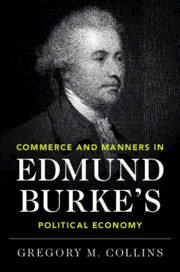Book contents
- Commerce and Manners in Edmund Burke’s Political Economy
- Commerce and Manners in Edmund Burke’s Political Economy
- Copyright page
- Dedication
- Contents
- Figures
- Tables
- Acknowledgments
- Introduction
- Part I Biography
- Part II Market Economies
- Part III The British Constitution and Economical Reform
- Part IV Foreign Trade
- Part V India
- Part VI The French Revolution
- 11 Reflections on the Revolution in France: Property, the Monied Interest, and the Assignats
- 12 The Real Rights of Men, Manners, and the Limits of Transactional Exchange
- Conclusion
- Bibliography
- Index
12 - The Real Rights of Men, Manners, and the Limits of Transactional Exchange
from Part VI - The French Revolution
Published online by Cambridge University Press: 24 April 2020
- Commerce and Manners in Edmund Burke’s Political Economy
- Commerce and Manners in Edmund Burke’s Political Economy
- Copyright page
- Dedication
- Contents
- Figures
- Tables
- Acknowledgments
- Introduction
- Part I Biography
- Part II Market Economies
- Part III The British Constitution and Economical Reform
- Part IV Foreign Trade
- Part V India
- Part VI The French Revolution
- 11 Reflections on the Revolution in France: Property, the Monied Interest, and the Assignats
- 12 The Real Rights of Men, Manners, and the Limits of Transactional Exchange
- Conclusion
- Bibliography
- Index
Summary
Chapter 12 includes the deeper normative arguments of Burke’s economic theory that come alive in the Reflections. Burke argued that among the real rights of men were the right to industry and the right to acquisition. He further contended that abstract theory overlooked the complexity of circumstance in social life, and that rigid government edicts intended to establish equality in civil society bred social chaos. Social engineering crushed the human soul. More important, I discuss Burke’s emphasis on the limits of transactional exchange in sustaining the growth of civilization. In his view, contracts could produce commercial opulence, but civilizations required pre-transactional bonds of religion, friendship, and manners in order to endure. Man’s moral obligations thus preceded the requirements of voluntary contracts; civilization might persist without commercial vitality, but it could not survive without virtue and chivalry. I also examine Burke’s commentary in Third Letter on a Regicide Peace, in which he provides remarks on the healthy state of the English economy, an Invisible Hand-type phenomenon, and the virtues of limited government, all of which complement his thoughts in Thoughts and Details and the Reflections.
Keywords
- Type
- Chapter
- Information
- Commerce and Manners in Edmund Burke's Political Economy , pp. 460 - 525Publisher: Cambridge University PressPrint publication year: 2020

